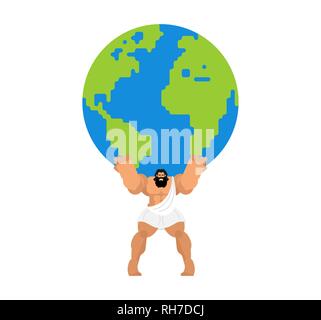

He had been connected with the Hesperides, or "Nymphs", which guarded the golden apples, and Gorgons both of which were said to live beyond Ocean in the extreme west of the world since Hesiod's Theogony. Ītlas became associated with Northwest Africa over time. In the 16th century, Gerardus Mercator put together the first collection of maps to be called an " Atlas" and devoted his book to the "King of Mauretania". King of Mauretania Ītlas was also a legendary king of Mauretania, the land of the Mauri in antiquity roughly corresponding with modern Northern Morocco and western Algeria. His grandfather was Elium "King of Phoenicia" who lived in Byblos with his wife Beruth. In these accounts, Atlas' father was Uranus and his mother was Gaia. The works of Eusebius and Diodorus also give an Atlantean account of Atlas. In some versions, Heracles instead built the two great Pillars of Hercules to hold the sky away from the earth, liberating Atlas much as he liberated Prometheus.Ītlas and the Hesperides by John Singer Sargent (1925) King of Atlantis Īccording to Plato, the first king of Atlantis was also named Atlas, but that Atlas was a son of Poseidon and the mortal woman Cleito. When Atlas set down the apples and took the heavens upon his shoulders again, Heracles took the apples and ran away. Heracles, suspecting Atlas did not intend to return, pretended to agree to Atlas's offer, asking only that Atlas take the sky again for a few minutes so Heracles could rearrange his cloak as padding on his shoulders. Upon his return with the apples, however, Atlas attempted to trick Heracles into carrying the sky permanently by offering to deliver the apples himself, as anyone who purposely took the burden must carry it forever, or until someone else took it away.


Heracles went to Atlas and offered to hold up the heavens while Atlas got the apples from his daughters. One of the Twelve Labours of the hero Heracles was to fetch some of the golden apples that grow in Hera's garden, tended by Atlas's reputed daughters, the Hesperides (which were also called the Atlantides), and guarded by the dragon Ladon. Beekes argues that it cannot be expected that this ancient Titan carries an Indo-European name, and he suggests instead that the word is of Pre-Greek origin, as such words often end in -ant. Traditionally historical linguists etymologize the Ancient Greek word Ἄτλας ( genitive: Ἄτλαντος) as comprised from copulative α- and the Proto-Indo-European root *telh₂- 'to uphold, support' (whence also τλῆναι), and which was later reshaped to an nt-stem.

Since the Atlas mountains rise in the region inhabited by Berbers, it has been suggested that the name might be taken from one of the Berber languages, specifically from the word ádrār "mountain". Virgil took pleasure in translating etymologies of Greek names by combining them with adjectives that explained them: for Atlas his adjective is durus, "hard, enduring", which suggested to George Doig that Virgil was aware of the Greek τλῆναι "to endure" Doig offers the further possibility that Virgil was aware of Strabo's remark that the native North African name for this mountain was Douris. The etymology of the name Atlas is uncertain. The name of Atlantis mentioned in Plato's Timaeus' dialogue derives from "Atlantis nesos" ( Ancient Greek: Ἀτλαντὶς νῆσος), literally meaning "Atlas's Island". The " Atlantic Ocean" is derived from "Sea of Atlas". The term Atlas has been used to describe a collection of maps since the 16th century when Flemish geographer Gerardus Mercator published his work in honour of the mythological Titan. He had many children, mostly daughters, the Hesperides, the Hyades, the Pleiades, and the nymph Calypso who lived on the island Ogygia. He was a brother of Epimetheus and Prometheus. Ītlas was the son of the Titan Iapetus and the Oceanid Asia or Clymene. In some texts, he is even credited with the invention of astronomy itself. In antiquity, he was credited with inventing the first celestial sphere. Atlas was said to have been skilled in philosophy, mathematics, and astronomy. Later, he became commonly identified with the Atlas Mountains in northwest Africa and was said to be the first King of Mauretania (modern-day Morocco and west Algeria, not to be confused with the modern-day country of Mauritania). According to the ancient Greek poet Hesiod, Atlas stood at the ends of the earth in extreme west. Atlas also plays a role in the myths of two of the greatest Greek heroes: Heracles ( Hercules in Roman mythology) and Perseus. In Greek mythology, Atlas ( / ˈ æ t l ə s/ Greek: Ἄτλας, Átlas) is a Titan condemned to hold up the heavens or sky for eternity after the Titanomachy.


 0 kommentar(er)
0 kommentar(er)
